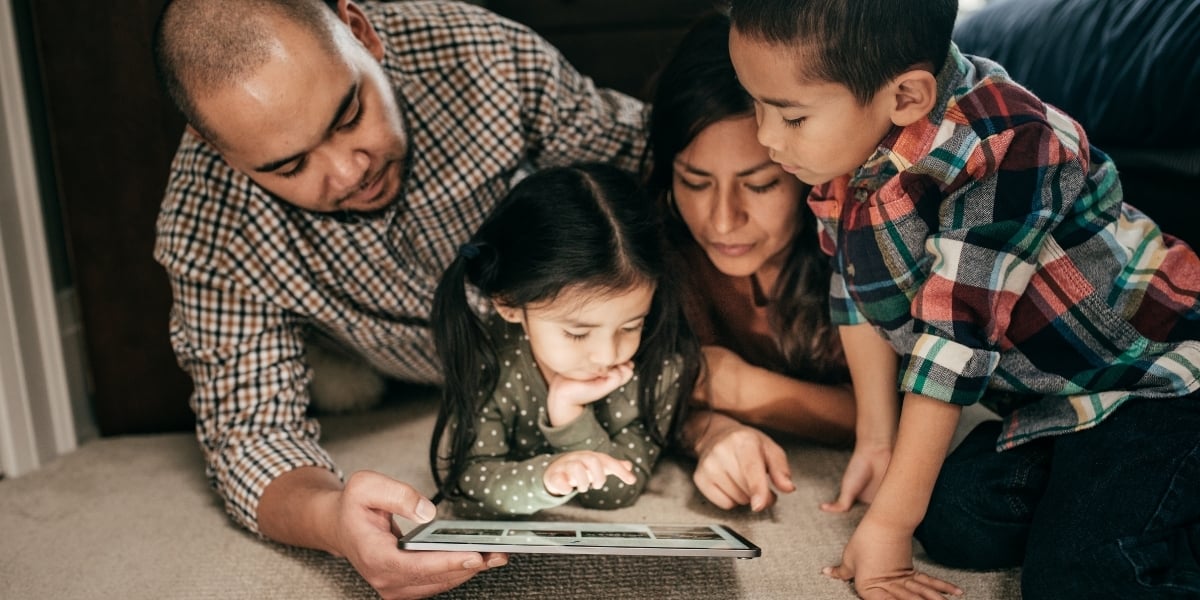Contents
1. Why is reading to your child important?2. What are the benefits?
3. What age should children be able to read
Reading is one of the most important life skills for children to learn. Not only is reading absolutely vital for future academic and general life success, it is also something that can be super enjoyable. Many people, even in today’s digital world, claim that reading is their favourite activity. For us at GoStudent, we aim to make children as enthusiastic as can be when it comes to reading. 🥰
One key aspect that is very much worth the discussion is the stage before and during the first reading milestones of children. Namely, reading to children! This is something that seems to happen automatically if you and your children enjoy a nice bedtime story or naptime book session. 📚
This is not just a calming activity, but incredibly beneficial for many reasons. Primarily, it helps foster reading skills later on. If you’ve ever wondered why reading to children is so important, we’ve got all the answers to your questions below! ⤵️
.jpg?width=1000&name=kid%20reading%20child%20book%20tale%20(1).jpg)
📔 Why is reading important for children?
It might seem that reading to your children is more of a pastime or bedtime necessity than fundamental learning. We understand why many could think this when wrapped up in storybooks.
However, there is much more to it than just convincing your children to go to sleep. Reading can be mutually beneficial and productive as a Kickstarter for the reading learning skills that are so vital for children. 🧠🧠🧠
Since the pandemic, we have seen a few lockdowns and children have done their fair share of distance and hybrid learning. On top of that, home-office policies have had many parents staying home and taking on teaching roles themselves.
Reading to children can be part of that routine as well and is incredibly important for many reasons. One of them is fostering a love and appreciation for reading. Hearing enthusiastic stories and reading them will incline them to interact and ask questions. 🙋
This is a great time to point to pictures and words and repeat them while you read for that extra sponge action in the brain. Either way, as the old saying goes, “Children see, children do.” If they feel joy, fun and magic while being read to, all those things will awaken in them as well. 😄
Along with joy and enthusiasm, there is the aspect of bonding between parent and child. This can bring a sense of safety, togetherness and trust. Spending time reading together can evoke the intimacy that allows your children to feel like they can trust you and listen to what you say. 💡
Check out some of the 10 shocking benefits of reading here:
✍🏼 Importance of reading for children
-
Cognitive development 👶
Next to the emotional aspects of reading to children, there are also many other benefits. Reading to children helps cognitive development and improves language skills. Cognitive development, as explained on HealthofChildren.com, is:
“...the emergence of the ability to think and understand; it’s the construction of thought processes, including remembering, problem solving, and decision-making, from childhood through adolescence to adulthood.” 🧠
Reading helps children’s brains to pick up on things in the world around them. It also improves general language skills, as children hear the pronunciation of words, simple grammatical structures and vocabulary.
-
Academic success 🎒
This coincides with academic success as well, as they early on learn about phonics, comprehension and phonemic awareness. As you can see, these processes are sort of like chain events that happen before and as they slowly start to learn to read. Think of it as the ultimate (but fun) learning prep!
-
Concentration 👩🏫
Another key benefit of reading at home with your child is increased concentration and discipline. The great thing about this is that they associate this time with something you all enjoy. At the same time, it gives them the incentive to listen actively and attentively, while hearing a story they enjoy. It can be a routine where they know that an important and productive activity is happening.
🔞 What age should children be able to read?
Knowing the average age when your children will start reading can be a good metric to go off of when reading to them. Does this mean the books should get longer, or activities be more interactive? Generally, this shouldn’t influence how much you read to them and which content you choose. 📕
Tips on reading: between the ages of 6 and 7 is where children begin to actually learn the fundamentals of reading. Some start out by sounding out unfamiliar words, using imagery for contextual help, reading aloud and correcting themselves. This is a great age to try out new techniques when reading directly to them. 💡💡💡
What age your child is reading at when they start doesn’t necessarily mean that they will be ahead forever. The same thing can be said for those who start later. The first reading milestones tend to happen in Year 1 and Year 2.
This is where a more formal approach to teaching reading comes in. Some methods include word recognition, where the emphasis is placed on context and meaning. Phonics is another way, which is all about phonemes and the sounds of words.
Overall, there is no right or wrong way to read to children as a parent. What is important is that you take the time to sit down and enjoy the process, it is a game changer for their future!









